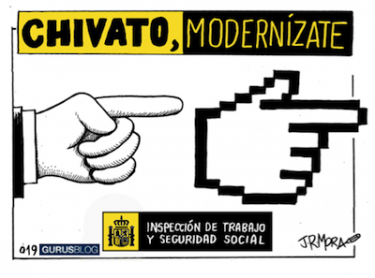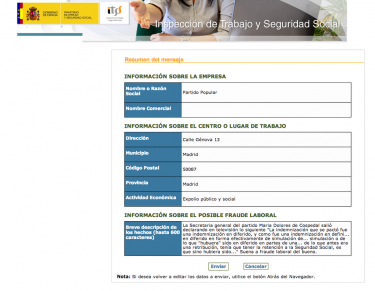The Spanish Minister of Employment and Social Security, Fátima Bañez, has launched [es] a “complaint box” to combat workplace fraud. The government is encouraging citizens to anonymously report cases of fraud committed by companies and individual workers for further investigation by the Office of Labor Inspection.

Cartoon by J.R Mora. Used with permission.
The “box” is a publicly accessible online form [es] on the Ministry's website.
The move has sparked controversy in the blogosphere and on social networks, and created a boomerang effect against the Spanish government: the first complaints received through the new system were directed at the government itself and members of the political sphere, not at ordinary citizens as intended. Once again, the people have demonstrated their wit and humor while responding to government action.
The main criticism of the complaint box is that with it the government aims to make citizens into “snitches,” creating an accusatory climate that is more like an authoritarian system than a democracy. Critics also say that its real goal is to persecute the most vulnerable people in society instead of going after the country's wealthiest citizens tax evasion or alleviating unemployment.
The contradiction has not gone unnoticed: that those claiming to combat fraud are part of a government overwhelmed by massive corruption scandals and suspected of illegal financing of its party, the ruling People's Party (PP).
Journalist Antonio Maestre wrote a complaint, using the new box, against the Secretary-General of the PP, María Dolores de Cospedal, and on Twitter he invited followers to follow in his footsteps:
El link al buzón de empleo para que hagáis una denuncia anónima como la mía. O a vuestro ingenio. http://t.co/LjY0rSgP8q
— Antonio Maestre (@AntonioMaestre) August 6, 2013
The link to the employment box so you can make an anonymous complaint like mine. Or one of your own invention. http://t.co/LjY0rSgP8q
— Antonio Maestre (@AntonioMaestre) August 6, 2013
Economist Ignacio Trillo also published images of the complaints that he submitted on the Ministry's site against senior People's Party officials and he displayed them on his blog with the following comment:
No hay que ser meridianamente inteligente para interpretar que esta iniciativa de Báñez, que cada vez cuenta en su Departamento con menos inspectores de Trabajo para estas tareas de inspección y control del fraude laboral, en contra de lo que se presume, no va destinada prioritariamente a descubrir y penalizar al malvado empresario explotador que mantiene a su plantilla de personal sin seguros sociales o pagándole en negro (…).Por el contrario, se trata de enfrentar, entre ellos, a las principales víctimas principales de la crisis, trabajadores y también entre pequeños autónomos, mientras más se encuentren en la escala inferior, mejor, como los que cobran ridículas prestaciones como los 420 euros al mes como único ingreso del Plan Prepara de su Ministerio, destinado a desempleados de larga duración que han finalizado la cobertura del desempleo y a los que la derecha, para más deshonra de los afectados, considera unos vagos por no encontrar o querer, como dicen, un puesto de trabajo.
One doesn't have to be overly intelligent to understand that this initiative of Báñez's, who has fewer and fewer labor inspectors in her Department doing this kind of workplace inspection and fraud monitoring, in contrast to what has been claimed, is not primarily aimed at discovering and penalizing the wicked exploitative businessman who doesn't provide his staff with social security or pays them under the table… On the contrary, it will affect, among others, the main and primary victims of the crisis, workers and the self-employed, the lower on the scale the better, like those who receive ludicrous benefits, like the 420 euros per month from her Ministry's PREPARA Plan, as the only income going to the long-term unemployed who have run out of unemployment benefits, and those that the right, to disrespect the affected even more, call lazy for not finding or wanting, in their words, a job.
Meanwhile, others have questioned the legality of this tool. Blogger Myriam Sánchez Nocea, a legal professional, gave an overview of the Spanish law on her blog Recursos Humanos y Derechos [es]:
Denunciar a alguien es otorgar al/ a la denunciante un poder muy peligroso; no sólo porque puede dar lugar a venganzas, revanchas,….; sobre todo es peligroso porque:
- se otorga a la ciudadanía el poder de interpretar las leyes. ¿Pero tenemos tod@s la formación jurídica necesaria para ello?. Me podrán decir que sólo se pide al ciudadano que señale que “hay algo que no le cuadra”.
Vale, es verdad. Pero ¿y si la denuncia conllevara la suspensión cautelar de la prestación hasta que el organismo administrativo correspondiente termine la investigación?.
- Se convierte a la ciudadanía en “agente de la autoridad”, en empleado público. ¿Acabaremos en una sociedad de espías y espiados?. ¿Trabajaremos gratis para el poder?.
Complaining against someone gives the whistle-blower a very dangerous power; not only because it can lead to revenge, retribution…; above all it's dangerous because:
-it gives the average citizen the power to interpret the laws. But do we all have the legal training for that? I would say that it asks the citizen to point out only that “something doesn't sit right.”
Okay, it's true. But what if the complaint leads to the cautionary suspension of a benefit until the relevant authority finishes its investigation?
- It turns the citizen into a “law enforcement officer,” in the public employ. Will it lead to a society of spies and those spied upon? Will we work for free in the service of power?
In a recent article, online newspaper El Diario.es [es] pointed out that even the law of Management of Labor Inspection specifies that “No anonymous complaints will be taken into consideration.” The government has defended itself, saying that the new measure deals with notifications more than complaints.
The blog Los Rábanos por las hojas [es] used irony to register its disapproval:
Para la ministra de Empleo, Fatima Bañez “el Estado de bienestar español y las conquistas sociales alcanzadas” están en peligro. Y no, la crisis no tiene la culpa. La gran amenaza se llama fraude laboral y, ante tamaño desafío, la ministra ha recurrido a un arma inesperada: el chivatazo ciudadano.
For employment minister Fatima Bañez “the Spanish welfare state and its social achievements” are in danger. And no, the crisis is not to blame. The major threat is labor fraud and, facing such a challenge, the minister has resorted to an unexpected weapon: the citizen snitch.
While at first reactions on the net mainly made fun of this new approach against workplace irregularities, efforts are now focusing on complaining about the controversial box and demanding its shutdown [es].








2 comments